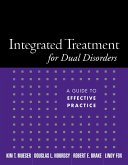Substance Use Disorders
Herausgeber: Moeller, Gerard; Terplan, Mishka
Substance Use Disorders
Herausgeber: Moeller, Gerard; Terplan, Mishka
- Broschiertes Buch
- Merkliste
- Auf die Merkliste
- Bewerten Bewerten
- Teilen
- Produkt teilen
- Produkterinnerung
- Produkterinnerung
This book addresses the neurobiology, pharmacotherapy, and behavioural therapy of substance use disorders from a clinical perspective. Ideal for residents and fellows, this book will provide a solid background for learning in psychiatry and addiction medicine and can also be used in clinical practice.
Andere Kunden interessierten sich auch für
![Substance Use Disorders Substance Use Disorders]() Antoine DouaihySubstance Use Disorders104,99 €
Antoine DouaihySubstance Use Disorders104,99 €![Psychosocial Interventions for Mental and Substance Use Disorders Psychosocial Interventions for Mental and Substance Use Disorders]() Institute Of MedicinePsychosocial Interventions for Mental and Substance Use Disorders49,99 €
Institute Of MedicinePsychosocial Interventions for Mental and Substance Use Disorders49,99 €![Mental, Neurological, and Substance Use Disorders in Sub-Saharan Africa Mental, Neurological, and Substance Use Disorders in Sub-Saharan Africa]() Uganda National Academy of SciencesMental, Neurological, and Substance Use Disorders in Sub-Saharan Africa47,99 €
Uganda National Academy of SciencesMental, Neurological, and Substance Use Disorders in Sub-Saharan Africa47,99 €![Substance Misuse Substance Misuse]() Substance Misuse39,99 €
Substance Misuse39,99 €![What Asylums Were, Are, and Ought to Be, Being the Substance of Five Lectures Delivered Before the Managers of the Montrose Royal Lunatic Asylum; c.2 What Asylums Were, Are, and Ought to Be, Being the Substance of Five Lectures Delivered Before the Managers of the Montrose Royal Lunatic Asylum; c.2]() What Asylums Were, Are, and Ought to Be, Being the Substance of Five Lectures Delivered Before the Managers of the Montrose Royal Lunatic Asylum; c.223,99 €
What Asylums Were, Are, and Ought to Be, Being the Substance of Five Lectures Delivered Before the Managers of the Montrose Royal Lunatic Asylum; c.223,99 €![A Treatise on Mental Derangement: Containing the Substance of the Gulstonian Lectures for May, 1822 A Treatise on Mental Derangement: Containing the Substance of the Gulstonian Lectures for May, 1822]() Francis WillisA Treatise on Mental Derangement: Containing the Substance of the Gulstonian Lectures for May, 182224,99 €
Francis WillisA Treatise on Mental Derangement: Containing the Substance of the Gulstonian Lectures for May, 182224,99 €![Integrated Treatment for Dual Disorders Integrated Treatment for Dual Disorders]() Kim T MueserIntegrated Treatment for Dual Disorders71,99 €
Kim T MueserIntegrated Treatment for Dual Disorders71,99 €-
-
-
This book addresses the neurobiology, pharmacotherapy, and behavioural therapy of substance use disorders from a clinical perspective. Ideal for residents and fellows, this book will provide a solid background for learning in psychiatry and addiction medicine and can also be used in clinical practice.
Hinweis: Dieser Artikel kann nur an eine deutsche Lieferadresse ausgeliefert werden.
Hinweis: Dieser Artikel kann nur an eine deutsche Lieferadresse ausgeliefert werden.
Produktdetails
- Produktdetails
- Verlag: Oxford University Press
- Seitenzahl: 384
- Erscheinungstermin: 1. Oktober 2020
- Englisch
- Abmessung: 251mm x 175mm x 23mm
- Gewicht: 703g
- ISBN-13: 9780190920197
- ISBN-10: 019092019X
- Artikelnr.: 60329978
- Herstellerkennzeichnung
- Libri GmbH
- Europaallee 1
- 36244 Bad Hersfeld
- gpsr@libri.de
- Verlag: Oxford University Press
- Seitenzahl: 384
- Erscheinungstermin: 1. Oktober 2020
- Englisch
- Abmessung: 251mm x 175mm x 23mm
- Gewicht: 703g
- ISBN-13: 9780190920197
- ISBN-10: 019092019X
- Artikelnr.: 60329978
- Herstellerkennzeichnung
- Libri GmbH
- Europaallee 1
- 36244 Bad Hersfeld
- gpsr@libri.de
F. Gerard "Gerry" Moeller, MD, is Director of the C. Kenneth and Dianne Wright Center for Clinical and Translational Research, and Associate Vice President for Clinical Research at Virginia Commonwealth University. He is also Director of the Institute for Drug and Alcohol Studies and Division Chair for Addiction Psychiatry. Awarded the C. Kenneth and Dianne Wright Distinguished Chair in Addiction Science, his research focuses on translational research on addictions, with a goal of developing novel treatments that reduce drug use and overdose. He is board certified in Psychiatry and Addiction Medicine. Mishka Terplan, MD, MPH, is board certified in both obstetrics and gynecology and in addiction medicine. His primary clinical, research, and advocacy interests lie along the intersections of reproductive and behavioral health. He is Associate Medical Director at Friends Research Institute and adjunct faculty at the University of California, San Francisco where he is a Substance Use Warmline clinician for the National Clinical Consultation Center. He is also the Addiction Medicine Specialist for Virginia Medicaid and a consultant for the National Center on Substance Abuse and Child Welfare. Dr. Terplan has active has published over 100 peer-reviewed articles with emphasis on health disparities, stigma, and access to treatment.
* Chapter 1: Epidemiology of Substance Use Disorders: Opioid Use
Disorder Epidemic
* Chapter 2: Epidemiology of Cannabis Use Disorder: Neural Substrates
and Treatment
* Chapter 3: Preclinical Models of Substance Use Disorder: Abuse
Liability Assessment and Candidate Pharmacotherapy Evaluation
* Chapter 4: Impulsivity and Drug-Seeking Behavior in Substance Misuse:
A Preclinical Perspective
* Chapter 5: Impulsivity and Cue Reactivity in Substance Misuse:
Clinical Studies
* Chapter 6: Stress and Substance Misuse
* Chapter 7: Overview: Barriers and Advantages of Utilization of FDA
Approved Medications for Substance Use Disorder
* Chapter 8: Methadone for Opioid Use Disorder
* Chapter 9: Use of Buprenorphine for the Treatment of Opioid Use
Disorder
* Chapter 10: Antagonist Treatment for Opioid Use Disorder: Development
of Antagonist Treatment. Antagonists vs. Agonist Treatments Pros and
Cons
* Chapter 11: Pharmacotherapy for Opioid Use Disorders in Special
Populations
* Chapter 12: Pharmacology of Alcohol Use Disorder
* Chapter 13: Pharmacotherapy for Smoking Cessation: Overview of
Medications Including Over-the-Counter Nicotine Replacement Therapy,
Bupropion and Varenicline
* Chapter 14: What is "Evidence Based" Treatment?
* Chapter 15: Evidence Based Behavioral Therapies for Substance Use
Disorder
* Chapter 16: Evidence Based Pharmacotherapy for Cocaine, Amphetamine,
and Methamphetamine Use Disorder: Overview and History of Clinical
Trials
* Chapter 17: Evidence Based Pharmacotherapy for Alcohol Use Disorder
* Chapter 18: Turn the Next Page: Envisioning the Future of Addiction
Therapeutics
Disorder Epidemic
* Chapter 2: Epidemiology of Cannabis Use Disorder: Neural Substrates
and Treatment
* Chapter 3: Preclinical Models of Substance Use Disorder: Abuse
Liability Assessment and Candidate Pharmacotherapy Evaluation
* Chapter 4: Impulsivity and Drug-Seeking Behavior in Substance Misuse:
A Preclinical Perspective
* Chapter 5: Impulsivity and Cue Reactivity in Substance Misuse:
Clinical Studies
* Chapter 6: Stress and Substance Misuse
* Chapter 7: Overview: Barriers and Advantages of Utilization of FDA
Approved Medications for Substance Use Disorder
* Chapter 8: Methadone for Opioid Use Disorder
* Chapter 9: Use of Buprenorphine for the Treatment of Opioid Use
Disorder
* Chapter 10: Antagonist Treatment for Opioid Use Disorder: Development
of Antagonist Treatment. Antagonists vs. Agonist Treatments Pros and
Cons
* Chapter 11: Pharmacotherapy for Opioid Use Disorders in Special
Populations
* Chapter 12: Pharmacology of Alcohol Use Disorder
* Chapter 13: Pharmacotherapy for Smoking Cessation: Overview of
Medications Including Over-the-Counter Nicotine Replacement Therapy,
Bupropion and Varenicline
* Chapter 14: What is "Evidence Based" Treatment?
* Chapter 15: Evidence Based Behavioral Therapies for Substance Use
Disorder
* Chapter 16: Evidence Based Pharmacotherapy for Cocaine, Amphetamine,
and Methamphetamine Use Disorder: Overview and History of Clinical
Trials
* Chapter 17: Evidence Based Pharmacotherapy for Alcohol Use Disorder
* Chapter 18: Turn the Next Page: Envisioning the Future of Addiction
Therapeutics
* Chapter 1: Epidemiology of Substance Use Disorders: Opioid Use
Disorder Epidemic
* Chapter 2: Epidemiology of Cannabis Use Disorder: Neural Substrates
and Treatment
* Chapter 3: Preclinical Models of Substance Use Disorder: Abuse
Liability Assessment and Candidate Pharmacotherapy Evaluation
* Chapter 4: Impulsivity and Drug-Seeking Behavior in Substance Misuse:
A Preclinical Perspective
* Chapter 5: Impulsivity and Cue Reactivity in Substance Misuse:
Clinical Studies
* Chapter 6: Stress and Substance Misuse
* Chapter 7: Overview: Barriers and Advantages of Utilization of FDA
Approved Medications for Substance Use Disorder
* Chapter 8: Methadone for Opioid Use Disorder
* Chapter 9: Use of Buprenorphine for the Treatment of Opioid Use
Disorder
* Chapter 10: Antagonist Treatment for Opioid Use Disorder: Development
of Antagonist Treatment. Antagonists vs. Agonist Treatments Pros and
Cons
* Chapter 11: Pharmacotherapy for Opioid Use Disorders in Special
Populations
* Chapter 12: Pharmacology of Alcohol Use Disorder
* Chapter 13: Pharmacotherapy for Smoking Cessation: Overview of
Medications Including Over-the-Counter Nicotine Replacement Therapy,
Bupropion and Varenicline
* Chapter 14: What is "Evidence Based" Treatment?
* Chapter 15: Evidence Based Behavioral Therapies for Substance Use
Disorder
* Chapter 16: Evidence Based Pharmacotherapy for Cocaine, Amphetamine,
and Methamphetamine Use Disorder: Overview and History of Clinical
Trials
* Chapter 17: Evidence Based Pharmacotherapy for Alcohol Use Disorder
* Chapter 18: Turn the Next Page: Envisioning the Future of Addiction
Therapeutics
Disorder Epidemic
* Chapter 2: Epidemiology of Cannabis Use Disorder: Neural Substrates
and Treatment
* Chapter 3: Preclinical Models of Substance Use Disorder: Abuse
Liability Assessment and Candidate Pharmacotherapy Evaluation
* Chapter 4: Impulsivity and Drug-Seeking Behavior in Substance Misuse:
A Preclinical Perspective
* Chapter 5: Impulsivity and Cue Reactivity in Substance Misuse:
Clinical Studies
* Chapter 6: Stress and Substance Misuse
* Chapter 7: Overview: Barriers and Advantages of Utilization of FDA
Approved Medications for Substance Use Disorder
* Chapter 8: Methadone for Opioid Use Disorder
* Chapter 9: Use of Buprenorphine for the Treatment of Opioid Use
Disorder
* Chapter 10: Antagonist Treatment for Opioid Use Disorder: Development
of Antagonist Treatment. Antagonists vs. Agonist Treatments Pros and
Cons
* Chapter 11: Pharmacotherapy for Opioid Use Disorders in Special
Populations
* Chapter 12: Pharmacology of Alcohol Use Disorder
* Chapter 13: Pharmacotherapy for Smoking Cessation: Overview of
Medications Including Over-the-Counter Nicotine Replacement Therapy,
Bupropion and Varenicline
* Chapter 14: What is "Evidence Based" Treatment?
* Chapter 15: Evidence Based Behavioral Therapies for Substance Use
Disorder
* Chapter 16: Evidence Based Pharmacotherapy for Cocaine, Amphetamine,
and Methamphetamine Use Disorder: Overview and History of Clinical
Trials
* Chapter 17: Evidence Based Pharmacotherapy for Alcohol Use Disorder
* Chapter 18: Turn the Next Page: Envisioning the Future of Addiction
Therapeutics








